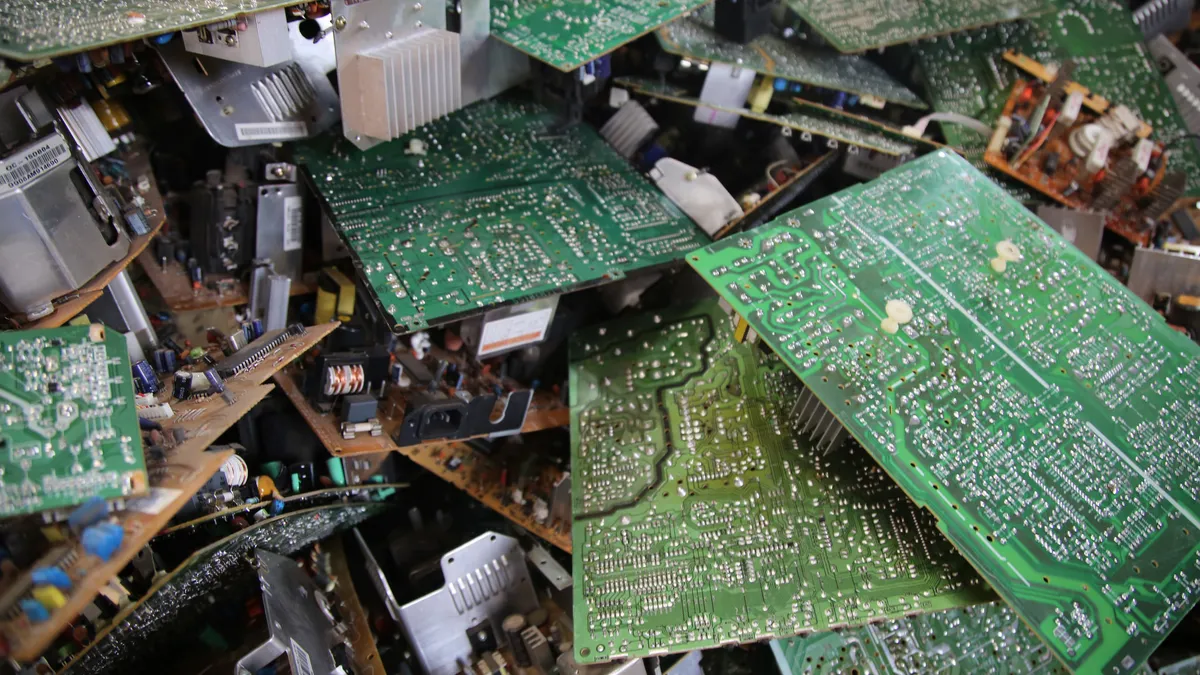Welcome back to another weekly waste news round up. For some parts of the country, the week was punctuated by a storm that dumped snow and ice before quickly melting away. For others, it was business as usual.
No matter where you are, though, the week brought with it plenty of stories that shaped national conversations and highlighted some bigger trends.
Let's get to it.
Stories that drove the week
After weeks of stalling, Houston approved a deal to keep its current recycling contract with Waste Management for one year.
- The contract would have expired today. Instead, it will now run until March 25, 2019, at which point FCC Environmental will take over.
- The council also voted earlier in the month to spend $467,200 to purchase 10,000 carts from Toter. A councilmember said the city's practice of purchasing an estimated $1 million-worth of carts each year is not "sustainable."
Houston's process of selecting and ultimately starting a new recycling contract has been dragging on for months. Extending Waste Management's processing contract for one more year was essentially a foregone conclusion, since FCC still needs to construct a new MRF, but this decision also took multiple weeks. Waste Management's head of recycling Brent Bell said recently that losing a contract in its HQ city was "unfortunate" but the company couldn't make some of the floor price guarantees Houston was looking for.
California is considering right to repair legislation.
- If passed, the bill would require electronics manufacturers to make repair and diagnostic information, as well as equipment and/or service parts, available to consumers and repair shops.
- Depending on the number of violations, fines could reach up to $5,000 per day. The bill is currently in committee.
California wouldn't be the first state to have right to repair legislation, but it would be the largest and is home to many Silicon Valley companies which oppose the concept. The country's most-populated state putting the right to repair into law could spur further action from other states across the country and, with some adjustments in consumer behavior, reduce the amount of e-waste that heads to landfills.
A bill in Florida would end hauler responsibility for contaminated loads.
- The bill, passed in the legislature, would require municipalities and private companies to address and define material contamination in curbside recycling programs.
- The bill does not list a statewide contamination standard or definition. Contracts would have to include strategies for reducing contamination and public education.
The National Waste and Recycling Association told Waste Dive this bill had been a priority in the Florida legislature for them this year. The organization also called it "trailblazing work" that could be an example for other states looking to combat contamination. The bill makes it so haulers and MRFs are not considered responsible for the handling of contaminated material under certain definitions in the contracts.
Teamsters in Ohio are bringing a legal challenge against Republic Services.
- Twenty-five workers represented by Teamsters Local 284 are alleging Republic that has violated overtime rules in Columbus. The policy at issue requires employees to change in and out of uniform off the clock.
- The complaints alleges violations of the Fair Labor Standards Act, Ohio Prompt Pay Act, state minimum wage law and state recordkeeping law.
According to the complaint, before May 17, 2017, employees were able to change in and out of uniform on the clock. Time for "donning" and "doffing" is an ongoing debate in the labor world. Republic said it could not offer comment because of the status of pending litigation.
The latest in M&A
- Waste Management acquired Anderson Rubbish Disposal and Moorpark Rubbish Disposal, which includes the transfer of exclusive franchise rights in Simi Valley and Moorpark, CA.
Did we miss a merger or an acquisition? Let us know by emailing cboteler@industrydive.com.
How are Chinese import policies playing out across the U.S.?
New data shows mixed paper exports from the U.S. to China were down 36% YoY for January and the drop in plastics was even steeper. On an international level, China recently announced that scrap imports were down 12% in 2017 and outlined a large-scale reshaping of how its regulatory framework. The Ministry of Environmental Protection has now been combined with multiple other branches into the new Ministry of Ecological Environment.
Market effects from China's import policies continued this week around the country. Reports from California, New Hampshire, Rhode Island, South Carolina and Virginia indicate the usual challenges. Program changes were also reported in Montana (mandatory) and New Mexico (voluntary), with other local governments considering the same as contracts come up for renewal or renegotiation.
Reducing contamination remains a common theme for all programs, regardless of how hard they've been hit, and states are stepping up their efforts on that front. While some of these developments were in progress before China's import policies came down, they are expected to assist in adapting. The two biggest examples this week come from the aforementioned Florida bill and an announcement that the Massachusetts Department of Environmental Protection has begun awarding up to $500,000 in grants for local communities to educate residents on contamination.
Do you know more? Get in touch with us.
You can follow all of this information on our 50 state tracker page. Tips and feedback are highly appreciated.
Other stories from the week...
- Starbucks announced $10 million in funding to projects looking to make more sustainable cups.
- A Chinese-owned firm is going to start recycling cartons in South Carolina.
- "Plastic Man" is getting a miniseries from DC Comics. He's a stretchy detective, not a MRF operator.
- A national cleanup campaign in Nepal is recruiting yaks to remove trash from Mount Everest.
- Professor Trash Wheel, the second litter-picking water wheel in Baltimore, is getting her own novelty beer.









